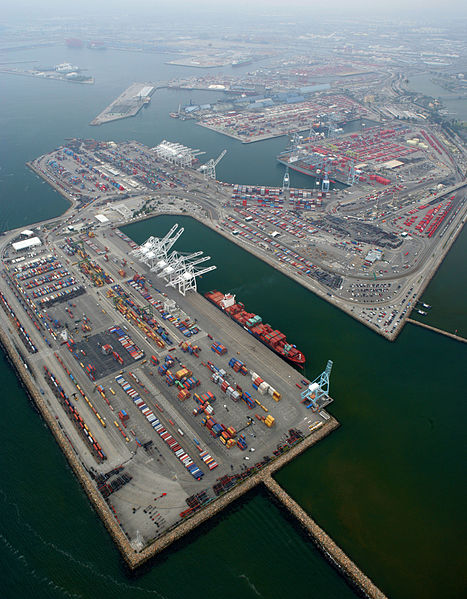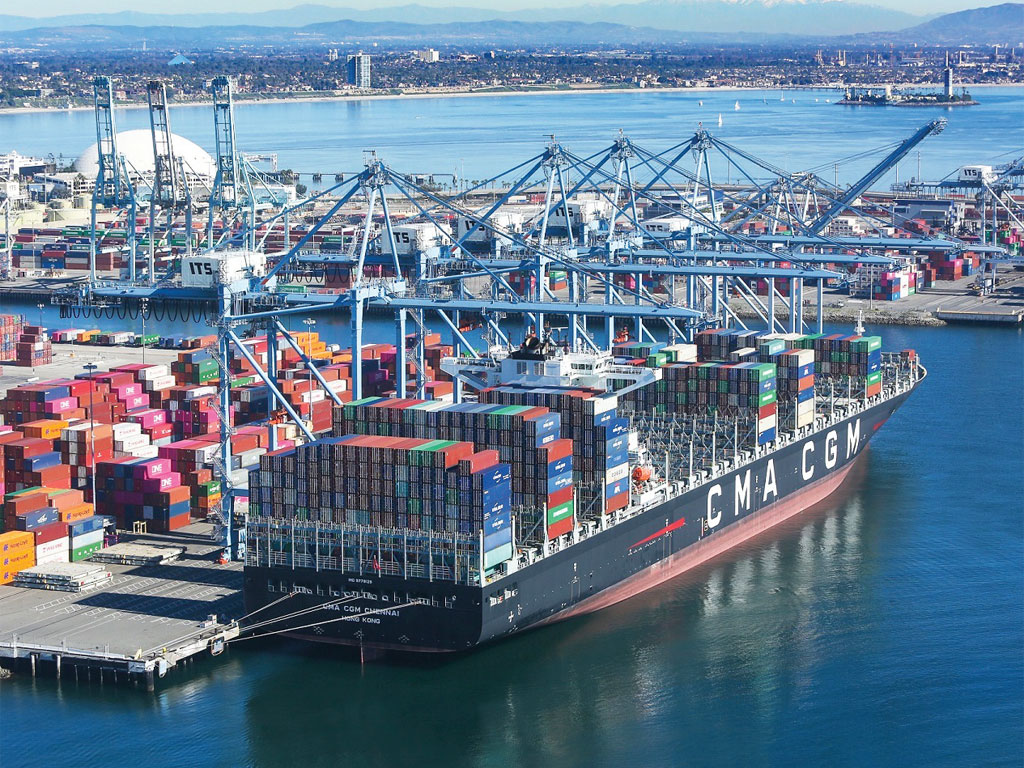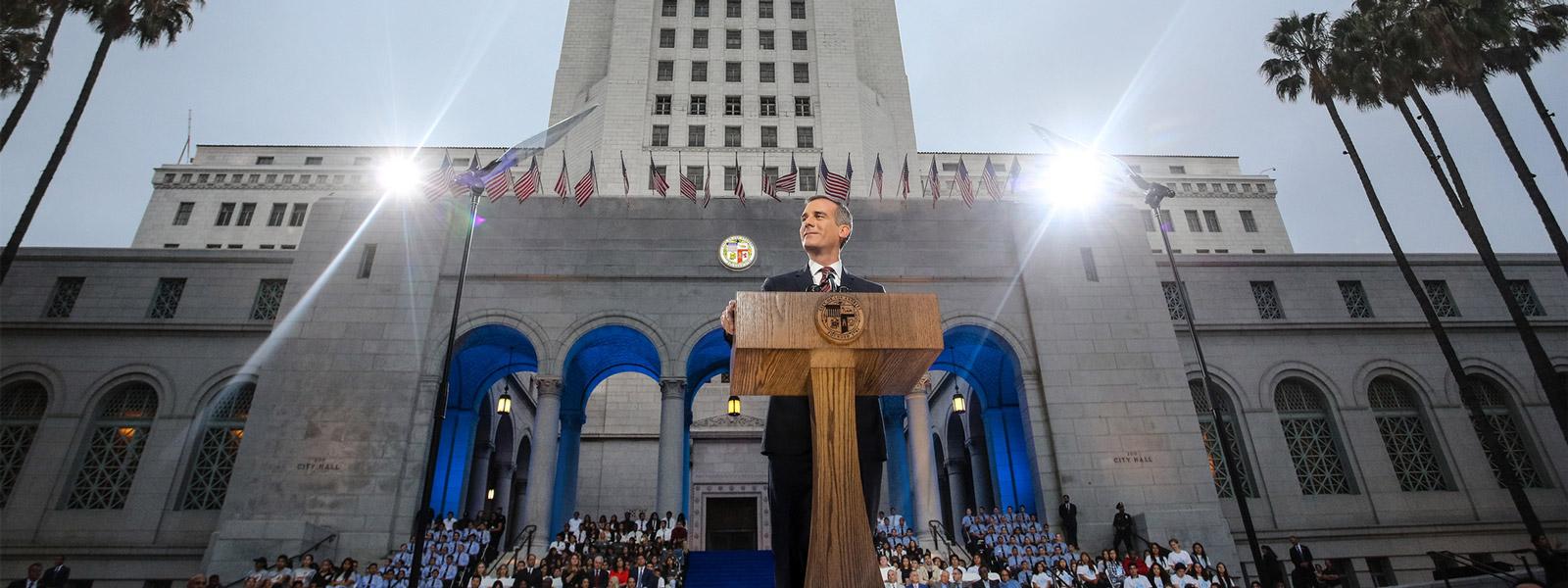
Port of Long Beach, CA. (Photo: USDHS via wikimedia commons)
Ports of Los Angeles, Long Beach Delay Idle Container Fines Following Port Improvements
Aging cargo rates have fallen by 25% in past three weeks, fewer ships remain backed up at ports
By Evan Symon, November 17, 2021 11:58 am
A planned fee system for backlogged shipping containers at the Ports of Long Beach and Los Angeles was delayed on Wednesday due to a significant decline of cargo staying on port grounds for more than a week.
Under the original plan unveiled late last month, shipping containers designated for being shipped out by trucks had only nine days to stay at marine terminals before fines would start to accumulate. Likewise, those designated to go out by rail had only three days to stay before fines would start. Shipping companies would have been charged $100 a day for each container of theirs left on the dock.
However, outcry from trucking, shipping, and rail companies over port constraints and not being given much time to alleviate delays forced both ports to move back the start date from November 1st to November 22nd.
During that time, port officials, under heavy local, state, national, and international pressure, significantly improved the container clear-out rate in conjunction with shipping lines, marine terminals, trucks and cargo owners, and rail companies. Aging cargo has dropped by 25% since late October, with cargo sitting for nine days or longer being dropped by 29%. Ships have also been processed faster, with over 100 waiting to be unloaded only a few weeks ago down to 84 this week.
“There’s been significant improvement in clearing import containers from our docks in recent weeks. After three weeks while working a record number of ships by our great ILWU (longshoreman union) men and women, we’ve reduced that 29% on the aging cargo side, and all imports are down about 25%,” said Port of Los Angeles Executive Director Gene Seroka in a statement. “The warehousing complex traditionally work during the day and they found it difficult to bring in workers during this time. On the trucking side, as we’ve explained before, drivers have a limit, federally-mandated, of 11 hours behind the wheel every day, and if they work consecutively, they must take a rest. We need to add more drivers.”
“There’s much more work to be done, but said there had been great progress by our dock workers, shipping lines, truckers, marine terminal operators and railroad partners.”
Port of Long Beach Executive Director Mario Cordero also commented, saying “We’re encouraged by the progress our supply chain partners have made in helping our terminals shed long-dwelling import containers. Clearly, everyone is working together to speed the movement of cargo and reduce the backlog of ships off the coast as quickly as possible. Postponing consideration of the fee provides more time, while keeping the focus on the results we need.”
Significant changes, more employees still needed despite recent improvements
While many have celebrated the fine delays, several port experts and workers stressed that there is still a significant delay at ports.
“They keep saying bring more trucks, get more truck drivers. But that isn’t a solution,” explained William Brady, a truck driver who often goes through the ports in Los Angeles and Long Beach. “We still have a lineup of trucks outside of both, and we still have drivers waiting for hours on end to go in and collect cargo. There is a critical nationwide shortage, but outside of ports right now that isn’t the pressing issue. It’s the unloading times and having crews work 24/7, the latter of which still hasn’t been implemented. Truck drivers are only part of it. When you look at other needs, like more dock and warehouse workers, or faster unloading times, you realize this isn’t a one-fix solution.”
“Meanwhile, shipping companies will be fined for something that isn’t their fault. The Port is the one causing the delay, and keeping containers at the Port has always been a way to help out companies who were affected. But with the fines, well, if an airport is the one causing a flight delay, they don’t charge the carriers a fine for having extra passengers waiting around, do they?”
Fines are currently expected to begin later this month barring another delay. All penalty fees collected from the new measure are to be invested into programs designed to increase efficiency in ports.
- Google Fires 28 for Anti-Israel Sit-in at Work - April 18, 2024
- California Retains Title As World’s 5th Largest Economy - April 18, 2024
- LA Mayor Bass’ Newly Touted Homeless Measures Face Backlash - April 17, 2024




